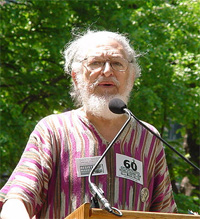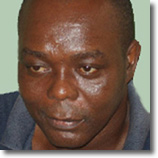The text message was short, sharp and to the point: “Your
friend Dennis Brutus died early today”.
It was December 26, 2009, and I was
in my village getting into the groove of the Christmas season. The
message came from my friend and brother, Jossey Ogbuanoh, who had
been my colleague in the defunct THISWEEK magazine back in 1987
when Dennis Brutus used to visit with me in the office when he was
in Nigeria. Over the years most of my Nigerian friends have wondered
at the letters I used to get from Brutus, the legendary South African
poet, author of A Simple Lust, Letters to Martha, Sirens Knuckles and Boots. Brutus and I have travelled the Lagos streets (with him lamenting
that there were still open drains on Nigerian streets). But Brutus
was not all complaints and seriousness, for he once suggested that
we should co-author a book of erotica!
In 1989 I was appointed a Distinguished Visitor at the Graduate
School of Journalism, University of Western Ontario, Canada. I travelled
to Canada and put a call through to Brutus who was then the head
of the Black Studies Department of the University of Pittsburgh,
USA. He immediately invited me over to deliver a lecture to his
literature students.
As I had only a single-entry visa
into Canada I could not possibly travel out of the country and be
allowed back in. The celebrated Zimbabwean journalist Geoff Nyarota
who was with me in Canada wondered aloud why I needed a visa in
the first place to get into Canada when as a fellow Commonwealth
citizen he had not travelled with a visa from Zimbabwe. I simply
told Geoff that the Nigerian was the exception to every rule, before
travelling out of my London-Ontario base to Toronto to process the
American visa. Naturally, the American Consulate in Toronto refused
to grant the visa as I had only a single-entry Canadian visa (which
as everyone knows, was proof that I planned to migrate permanently
to the US). I pointedly told the white American visa officer that
I would make him reverse his decision because of my “intimidating
connections”.
Back to my Primrose Hotel lodge in
downtown Toronto, I called my hosts in Canada, and Professor Peter
Desbarats advised me to extend my stay at the hotel for another
week while he made necessary contacts to reverse the visa refusal.
I called Dennis Brutus who threatened to take his protest to the
American Congress! I then called the top editors of Canada’s
Globe and Mail newspaper and magazine, John Cruickshank and Peggy
Wente, whom I had earlier interacted with. In no time at all, things
started happening. The American Consulate in Toronto got more protest
letters and fax messages than even their huge offices could contain.
The American Consulate had the good grace to beg me to come back
and take the visa!
It was instructive that a black man
was on hand to attend to me when I got back to the Consulate. He
made all the genial apologies and granted me a multiple-entry American
visa. Curiously, when I flew into the United States in a plane named
Canadian Partner I did not have to pass through the international
wing of the Pittsburgh Airport. To that extent, I did not even need
the American visa in the first place. It was like flying from Ikeja
to Calabar: no Customs, no Immigration, nothing. I simply walked
into the American wonderland without even setting eyes on the people
Dennis Brutus had dispatched to the international wing of the airport
to receive me!
I settled into Ramala Hotel in downtown
Pittsburgh after the suspicious hotel staff had called for the confirmation
of Dennis Brutus and cross-checked his credit card. The taxi man
who came to pick me up the next morning happened to be a fellow
Nigerian stranded in the US!
My lecture at the University of Pittsburgh’s
Centre for Black Education and Development dwelt on Ngugi wa Thiong’o’s
novel, Devil on the Cross, comparing the wanton capitalism
that America represented with the oppressed Kenyan peasantry that
the heroine Jacinta Wariinga underscored.
After the lecture I helped Brutus to
run his office. I sorted out his mail, tearing the useless letters
of fellows asking for odd favours and filing the relevant ones for
his later attention. He told me how he unwittingly used to tear
up cheques sent to him without actually opening the letters! He
would only get to learn much later that he had torn a cheque following
further inquiries by the sender. On the many books regularly sent
to him by diverse authors, Brutus said he would ask the authors
if they wanted “nice noises” from him or real critiques.
His pet project then was the Union
of the Writers of the African Peoples (UWAP). Our walks round the
campus took us through the bar and the restaurant, the library,
the conference centre hosting the Russian-American “Chittaqua
at Pitt” international seminar, and the many gardens where
Brutus poetically analyzed the flowers and the bookshop. It was
at the bookshop that I fell in love with a dictionary – and
insisted that Brutus buy it for me.
“That’s not how to ask
for a favour,” said the astonished Brutus.
“But I want the dictionary just
the same,” I maintained.
That was how I became the proud owner
of Webster’s Encyclopedic Unabridged Dictionary of the English
Language, which set Brutus back by almost 100 dollars! The book
was so heavy that the fire which consumed my library recently could
only char a handful of its pages!
I am only just coming to terms with
the loss of my dear friend Dennis Brutus on December 26. He was
shot in the back with a deadly gun by the goons of the Apartheid
regime and he was jailed in the notorious Robben Island prison alongside
Nelson Mandela. He, more than any mortal, played a pivotal role
in the exclusion of Apartheid South Africa from the Olympic Games
and sundry international sports. Above all else, he was the immortal
poet who penned Somehow we survive. Adieu, my great friend, Dennis Brutus..  |

![African Writing Online Home Page [many literatures, one voice]](http://www.african-writing.com/nine/images/logo9.png)









![]()
![]()


